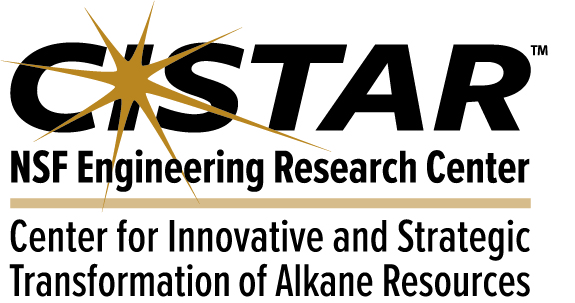Courses and Professional Development
CISTAR Graduate Course: Energy Transition to a Sustainable Future
Faculty at The Center for Innovative and Strategic Transformation of Alkane Resources (CISTAR) are collaborating to create an innovative course designed to give senior undergraduate and graduate students a comprehensive understanding of the shift from conventional fossil fuels to sustainable energy resources. The collaborative teaching effort brings together experts from academia and industry, each contributing unique perspectives to offer a holistic education on the complexities of the energy transition.
The "Energy Transition to a Sustainable Future" course covers various topics crucial for comprehending and contributing to the global movement towards sustainable energy solutions with lower CO2 emissions. The curriculum is designed to equip students with in-depth knowledge about various aspects of the transition, fostering a well-rounded understanding of the challenges and opportunities to a sustainable and low CO2-footprint energy future.
Learning Objectives:
- Historical, Current, and Future Roles of Hydrocarbons: The goal is to provide a nuanced understanding of hydrocarbons as a foundation for energy and materials, laying the groundwork for the subsequent exploration of alternatives.
- Environmental Impact of Energy Production and Use: Understanding the full scope of energy production and use involves an exploration of its environmental impact. The course will address the environmental, health, legal, and social dimensions, ensuring that students grasp the multifaceted consequences of our current energy practices.
- Carbon Capture, Storage, and Conversion: With a focus on future environmental CO2 reductions, students will gain insight into innovative approaches to mitigate the impact of carbon emissions on the environment.
- Decarbonization of Energy Production: The course will provide a comprehensive overview of the various options for decarbonizing energy production. From technological advancements to policy considerations, students will explore the strategies and initiatives essential for achieving a low-carbon and sustainable energy
The course culminates with a project assignment, where student teams, made of students from multiple sites, will investigate these topics further and then present them to the group. By combining the expertise of CISTAR Universities with corporate partners, this course fosters interdisciplinary thinking essential for tackling the intricacies of the energy transition. Participants will then be poised to become leaders and innovators in pursuing a sustainable energy future, armed with the knowledge and skills to navigate the evolving energy landscape.
Dow Industrial Reaction Engineering Course

This course, led by experts from CISTAR industry partner Dow, provides an overview of conventional and non-conventional reactors used in industry to manufacture chemical intermediates and products, with a focus on the design and scale-up of these reactors. For each reactor category, the lecture reviews typical applications and highlights relevant features of those reactors, including the reactor geometry, contacting pattern, heat management strategy, transport limitations, and rate-limiting steps. With those features in mind, the scale-up of each reactor type is discussed, focusing on conceptual design rather than mechanical details.
The course is currently available asynchronously. For more information about how to access the course materials, including how to earn the course certificates, please visit our instructions or e-mail cistar@purdue.edu with any questions.
Certificate 1: Industrial Reaction Engineering (11 Lectures)
I. Fundamentals
- Kinetics, transport, contacting patterns, thermodynamics
II. Conventional reactors
- Gas-liquid-solid or liquid-solid fixed beds
- Fixed beds - Gas-solid
- Stirred tanks
- Fluidized beds
- Bubble columns
- Loop reactors
- Tubular reactors
- Reactive extruders
- Moving beds
- Electrochemical reactors
Certificate 2: Advanced Industrial Reaction Engineering (9 Lectures)
III. Non-conventional reactors
- Rotating packed beds and other centrifugal reactors
- Microreactors
- Reactive distillation
- Autothermal monolithic catalyst reactors
- Oscillatory flow baffled reactors
IV. Additional topics
- Heterogeneous Catalysts: Considerations for the Researcher
- The Industrial Reaction Engineers Toolkit
- Petrochemical Industry: Past, Present and Future
Energy Production & Processes from Shale Hydrocarbons
A survey course on all aspects of light hydrocarbons as a bridge to a net-zero carbon economy. This course blends catalysis/reaction engineering, separations, process engineering, process optimization/modeling, life-cycle/impact assessment, and policy to examine how light hydrocarbons are currently used and how they are being deployed as a bridge to a net-zero carbon economy.
The course was offered in Spring 2022 and organized by the following CISTAR faculty:
- Jeff Miller, Purdue University
- Abhaya Datye, University of New Mexico
- Joan Brennecke, the University of Texas at Austin
- Ruilan Guo, University of Notre Dame
Learning Objectives:
- Understand the historical, current, and potential future roles that hydrocarbons play in the economy for energy, fuels, and materials.
- Understand and compare the ways that energy is used in society, especially the breakdown between electricity/power and fuels.
- Understand the environmental impact (environmental, health, legal, social) of the utilization of hydrocarbons for energy production.
- Understand the methods for carbon capture, storage, and conversion to meet future environmental CO2 reductions.
- Understand the options for decarbonization of energy production
Global Energy Outlook and Carbon Management, Jeff Miller (PU)
An Introduction to Hydrocarbon Recovery Phases and Mechanisms, Matt Balhoff (UTA)
Unconventional Oil and Gas Development, Jon Olson (UTA)
LHCs from Shale Formations: industry and environmental concerns and opportunities, Johannes Schwank (UNM)
Extraction of LHCs from Shale Formations, Nathan Schultheiss (PU)
Economics of Natural Gas & Light Hydrocarbons, Tom Degnan (UND)
Petroleum Industry, Tom Degnan (UND)
Methane Emissions from Shale Gas Production, Dave Allen (UTA)
CO2 Capture, Joan Brennecke (UTA)
CO2 Conversion, David Heldebrant (PNNL)
Mentoring-In-Action Workshops
CISTAR has offered this interactive mentoring workshop to summer program participants. Learn more






